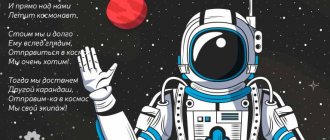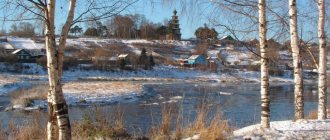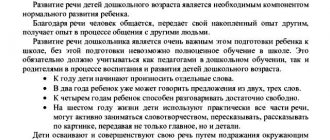Poem about planets for children
Children's poems: to kindergarten | about nature | about vegetables | about fruits | about animals | about school | about the days of the week | about colors
Shape: cool | beautiful | sms | short
An astrologer lived on the Moon. He kept track of the planets: MERCURY - one, VENUS - two, three - EARTH, Four - MARS, Five - JUPITER, Six - SATURN, Seven - URANUS, Eight - NEPTUNE, Nine - the farthest PLUTO, Who If he doesn’t see it, get out!
2
In order, all the planets can be named by any of us: One - Mercury, Two - Venus, Three - Earth, Four - Mars. Five is Jupiter, Six is Saturn, Seven is Uranus, followed by Neptune. He is the eighth in a row. And behind it, then, is the ninth planet called Pluto.
3
What luminaries are called planets? There are stars in the sky, but they are very strange. They walk across the sky among other Other, real, twinkling stars. And are they stars? — We are concerned about the question. A wandering star wandering across the sky is not a star at all, but a planet! Planets, unlike stars, are cold - They do not shine, they only reflect light, alas! And this light is bright, but of different shades. They are different in some way, I guess. Different surfaces - that's the secret. Let's study the planets and look for the answer.
4
Elusive, little Mercury is the first to meet solar storms. The second, behind him, flies Venus With a heavy, dense atmosphere. And the third, the carousel spins, Our earthly cradle. The fourth is Mars, the rusty planet, the red-orange one. And then they rush, like a swarm of bees, the asteroids in their orbit. The fifth is Jupiter, very large and clearly visible in the starry sky. Sixth - Saturn, in chic rings, Charming, under the rays of the sun. The seventh - Uranus, lay down like a couch potato, Because his long path is difficult. The eighth is Neptune, the fourth gas giant. He is a dandy in a beautiful blue shirt. Pluto, Charon, the ninth in the system, pass the time in the darkness as a duet.
5
There is no air in outer space, and nine different planets are circling there. And the Sun is a star in the very center of the system, And we are all connected by gravity.
The sun-shine bubbles like a volcano, Seethes like a boiling cauldron, incessantly, Prominences fly up like a fountain, Gives life and warmth to everyone tirelessly.
The sun-star is a huge ball, emitting light like a fire. Well, the planets reflect that light, they adore the Sun!
Many planets fly around the Sun. Maybe people live on them? Come on, you and I will get into the rocket, Let's rush away from the Sun in the blue darkness!
Maybe Mercury will please us? And he will bring us friends from the whole class!
6
An astrologer lived on the Moon. He kept track of the planets: MERCURY - one, VENUS - two, three - EARTH, Four - MARS, Five - JUPITER, Six - SATURN, Seven - URANUS, Eight - NEPTUNE, Nine - the farthest PLUTO, Who If he doesn’t see it, get out!
7
The black velvet of the sky is embroidered with stars. A bright path runs across the sky. It spreads easily from edge to edge, as if someone spilled milk across the sky. But, of course, there is no milk or juice in the sky, We see our star system from the side. This is how we see the Galaxy. Our distant native light is space for astronautics for many thousands of years.
8
Neptune in blue radiance - “sea deity” Found, in calculated coordinates, - Halle. The calculations of Adams and Le Verrier became a triumph for all whose works revealed the laws of heaven. The eighth from the Sun, thirty times further than our Earth. Much denser, among the giant planets. Thirteen companions are known from his family, He is in rings made of dust particles, elegant. Methane atmosphere, winds, clouds, One of the satellites, in reverse motion, With the surface only slightly covered with nitrogen It is clear what gravity was enough for.
9
Look! Do you know who this wanderer is? It is called by the name of God - the messenger. The planet closest to the Sun - Let's get acquainted - is Mercury. He loves to hide in the rays Faster than anyone else and very strongly From the heat in solar ovens The surface is hot for a long day. From the wind of the Sun there is only the atmosphere. And where the kingdom of dark night is, the temperature stays at about minus two hundred. By the way, it looks like a double of the Moon, a neighbor. The landscapes around us are familiar, Meteorites often fall, and the composition of the soil is even similar.
10
Venus is a very hot planet. Do you want to be more precise? I'll say it differently. Four hundred seventy-five Celsius. In short, it's so hot that you could hang yourself. Yes, and it cannot be any other way. Everyone knows this: Venus is the second planet from the Sun. From Earth it is bright white.
In terms of mass and overall dimensions, Venus and the Earth are generally similar. Believe me, this is why astronomers of the world call Venus the Sister Planet. Only it is younger than the Earth. Scientists made measurements... And it turned out that the Earth is eight times older than Venus. It's not a big deal, but it's nice.
A year on Venus is two-thirds that of Earth. This is not little, but not much either. The coolest number of hours in a day is - There are two thousand eight hundred of them. The sun rises on Venus in the west. Maybe you will say: “Here you have it!” But this is an astronomical fact: Venus rotates somehow differently.
Its atmosphere is carbon dioxide, plus a small admixture of nitrogen. The pressure on the ears is beyond measure - Almost ninety-three atmospheres. Such pressure, although not fatal, is close to the limit for a person. Dive about ninety meters into the water - it’s very easy to become a Venusian.
11
The fourth is Mars, red-orange, Wandering in the sky along the ecliptic constellations. Two tiny satellites, discovered once, Under the names: Phobos, Deimos - as retribution Two times smaller than Venus And the gravitational force is small The compositions of the atmosphere are similar, But it is very rarefied And rarely completely transparent From long dust storms and light clouds. There are riverbeds that have long been lost. Volcanoes are sleeping, mountains have risen high, Less heat from the Sun - and the water has frozen in permafrost. Twice: its path is longer, years. But the days are counted like on Earth.
12
In order, all the planets can be named by any of us: One - Mercury, Two - Venus, Three - Earth, Four - Mars. Five is Jupiter, Six is Saturn, Seven is Uranus, followed by Neptune. He is the eighth in a row. And behind it, then, is the ninth planet called Pluto.
13
An astrologer lived on the Moon. He kept track of the planets: MERCURY - one, VENUS - two, three - EARTH, Four - MARS, Five - JUPITER, Six - SATURN, Seven - URANUS, Eight - NEPTUNE, Nine - the farthest PLUTO, Who If he doesn’t see it, get out!
14
In order, all the planets can be named by any of us: One - Mercury, Two - Venus, Three - Earth, Four - Mars. Five is Jupiter, Six is Saturn, Seven is Uranus, followed by Neptune. He is the eighth in a row. And behind it, then, is the ninth planet called Pluto.
15
Space fairy tale (fragment) Space is painted black, Since there is no atmosphere, There is neither night nor day. There is no earthly blue here, Here the views are strange and wonderful: And the stars are all visible at once, And the Sun and the Moon.
A star is visible in the north, and it is called the Polar Star. She is a reliable friend of people, And two Ursa bears are with her Among the cosmic lights They all walk in a row.
More poems: < 129 130 131 132 133 134 135 136 137 138 139 >





